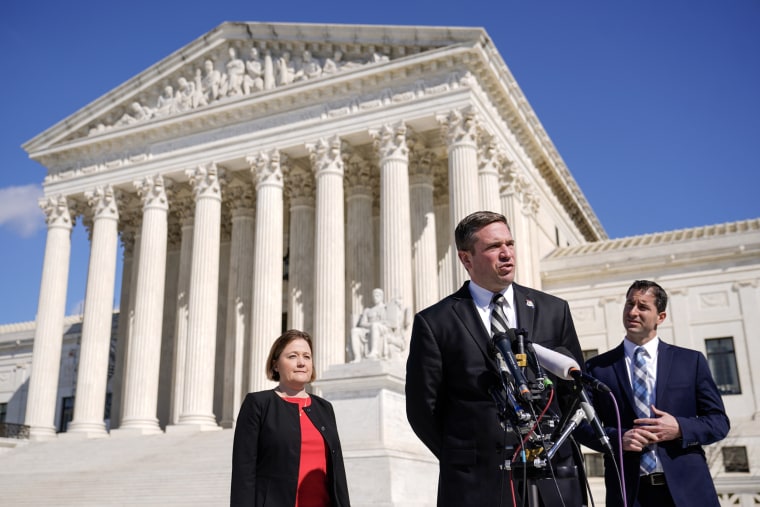North Dakota governor signs law limiting transgender care for minors
North Dakota’s Republican Gov. Doug Burgum signed a bill into law that restricts transgender health care in the state, immediately making it a crime to give gender-affirming care to people younger than 18.
Gender-affirming care for minors has been available in the U.S. for more than a decade and is endorsed by major medical associations, but it has increasingly come under attack in many conservative legislatures, including North Dakota’s, where lawmakers have passed at least three bills targeting trans people this year.
The measure that Burgum signed Wednesday received veto-proof support from GOP lawmakers — though some Republicans did vote against it, alongside all Democrats.
In a statement released Thursday morning, Burgum said the law is “aimed at protecting children from the life-altering ramifications of gender reassignment surgeries” but he added that medical professionals have testified these surgeries have not been and are not being performed on minors in North Dakota.
He said the law still allows medication treatment for early onset puberty and other rare circumstances with parental consent, and minors currently receiving gender-affirming care will still be able to receive treatment.
“Going forward, thoughtful debate around these complex medical policies should demonstrate compassion and understanding for all North Dakota youth and their families,” he said.
The new law takes immediate effect and allows prosecutors to charge a health care provider with a felony — up to 10 years in prison and $20,000 in fines — for performing sex reassignment surgery on a minor.
It also enables prosecutors to charge a provider with a misdemeanor — up to 360 days in prison and $3,000 in fines — for giving gender-affirming medication, like puberty blockers or hormone therapy, to a trans child.
The American Civil Liberties Union of North Dakota denounced the new law as “a vast government overreach that undermines the fundamental rights of parents” and that violates constitutional guarantees of equal protection and due process by singling out gender-affirming care for prohibition.
“By signing this bill into law, Gov. Burgum has put the government in charge of making vital decisions traditionally reserved for parents in North Dakota,” Cody Schuler, the group’s advocacy manager, said in a statement. “This ban won’t stop North Dakotans from being trans, but it will deny them critical support that helps struggling transgender youth grow up to become thriving transgender adults.”
Earlier this month, Burgum also signed a transgender athlete ban into law after it similarly passed the House and Senate with veto-proof majorities. In 2021, Burgum vetoed a bill that would have imposed a transgender athlete ban at that time, but House and Senate lawmakers did not have enough votes back then to override his veto.
North Dakota joins at least 13 other states that have enacted laws restricting or banning gender-affirming care for minors.
Republican lawmakers across the country have advanced hundreds of measures aimed at nearly every facet of trans existence this year.
That includes bans on gender-affirming medical care for minors, restrictions on the types of restrooms transgender people can use, measures restricting classroom instruction on sexual orientation and gender identity, and bills that would out transgender students who want teachers to address them by the pronouns they use.
The Food and Drug Administration approved puberty blockers 30 years ago to treat children with precocious puberty — a condition that causes sexual development to begin much earlier than usual. Sex hormones — synthetic forms of estrogen and testosterone — were approved decades ago to treat hormone disorders or as birth control pills.
The FDA has not approved the medications specifically to treat gender-questioning youth, but they have been used for many years for that purpose “off label,” a common and accepted practice for many medical conditions. Doctors who treat transgender patients say those decades of use are proof the treatments are not experimental.
Research has shown that transgender youths and adults can be prone to suicidal behavior when forced to live as the sex they were assigned at birth. And critics of legislation to restrict gender-affirming care for children say it’s an attempt by conservatives to motivate their voting base.
Proponents of the measure have raised concerns about children changing their minds. Yet the evidence suggests detransitioning is not as common as opponents of transgender medical treatment for youth contend, though few studies exist and they have their weaknesses.


